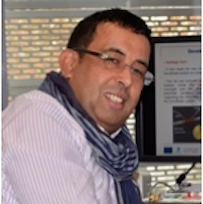
|
Pr. Errachid AbdelhamidUniversité Claude Bernard Lyon 1, France |
Pr. Errachid Abdelhamid
Research
Design and elaboration of chemo- Biosensors and BioLab-on-a-chip using silicon technology.
Development of chemo- Biosensors and BioLab-on-a-chip on plastic foil using top-down and bottom-
up approaches.
Development of unconventional micro&nanotechnologies to fabricate new flexible analytical tools (Bio-
micro&nanosystems, micromixers, and microfilters) using micro&nanocontact printing, soft-lithography,
and UV-NanoImprint Lithography (UV-NIL).
Biofunctionalization, micro&nanobiotechnology, and Packaging process.
Biography
Prof. Abdelhamid Errachid received his Ph.D degree from the Universitat Autonoma de Barcelona in
1997. From 1997 until 2001 he worked as junior research scientist at the CNM. From 2001 till 2008 he
worked as senior research at the department de electronica, Universidad de Barcelona and IBEC.
Finally, since the end of 2008, he is a full professor at the University Claude Bernard-Lyon 1. He has
been involved as a coordinator, principal investigator, and team leader in several European projects
under 5th, 6th, 7th and H2020 framework programmes: FP6: (DVT-IMP, MAPTech, SPOT-NOSED,
Nano2Life, Ares, Vector), FP7 (SensorART, BOND and H2020 (HEARTEN), as well as NATO, INTAS
and TEMPUS International projects and national Spanish projects (MIROMINCE, MINAHE I, MINAHE
II and PETRI). He obtained top-level results in the field of silicon-based (bio)chemical sensors using
field-effect transistors and micro/nanoelectrode structures. His deep knowledge and understanding of
the electronic devices structure as well as operation and interplay between (bio)chemical molecules
and electronics, has resulted in development of new (bio)sensor devices (an example, the original
nanosensor device based on olfactory proteins developed under SPOT-NOSED project).
Prof.
Errachid was a head of the SIMS (Surfaces- (bio) Interface- Micro/nano Systèmes) group from 2009
until 2013 and now he is a head of the micro&nanobiotechnology group. He is also proficient in
teaching and training experience at undergraduate, postgraduate, and post-doctoral levels.

